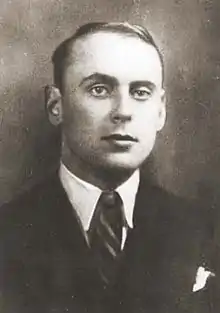Józef Marcinkiewicz
Józef Marcinkiewicz (Polish pronunciation: [ˈjuzɛf mart͡ɕinˈkʲɛvit͡ʂ]; 30 March 1910 in Cimoszka, near Białystok, Poland – 1940 in Kharkiv, USSR) was a Polish mathematician.[1]
Józef Marcinkiewicz | |
|---|---|
 Marcinkiewicz ca.1939 | |
| Born | 30 March 1910 |
| Died | 1940 (aged 29–30) |
| Nationality | Polish |
| Known for | Marcinkiewicz multiplier theorem Marcinkiewicz interpolation theorem Marcinkiewicz–Zygmund inequality |
| Scientific career | |
| Fields | Mathematics |
| Institutions | Vilnius University |
He was a student of Antoni Zygmund; and later worked with Juliusz Schauder, Stefan Kaczmarz and Raphaël Salem. He was a professor of the Stefan Batory University in Wilno.
He enlisted in the Polish Army during the German invasion of Poland. In the aftermath of the simultaneous Soviet invasion of Poland, Marcinkiewicz was taken as a Polish POW to a Soviet camp in Starobielsk. The exact place and date of his death remain unknown, but it is believed that he died, when aged 30, murdered by the NKVD in Kharkiv. His parents, to whom he gave his manuscripts before the beginning of World War II, were transported to the Soviet Union in 1940 and later died of hunger in a camp.
Their fate is described by Zygmund[2] described the last and his lost mathematical works as follows:
War broke out a few days after Marcinkiewicz returned to Wilno. Zygmund writes On 2 September, the second day of the war, I came across him accidentally in the street in Wilno, already in military uniform ... We agreed to meet the same day in the evening but apparently circumstances prevented him from coming since he did not show up at the appointed place. A few months later came the news that he was a prisoner of war and was asking for mathematical books. It seems that this was the last news about Marcinkiewicz. During his time in Paris and England, Marcinkiewicz had produced some mathematical work which he had written down in manuscript form. After returning to Poland he gave these manuscripts to his parents for safe keeping. Sadly Marcinkiewicz's parents suffered the same fate as he did and died during the war. No trace of the manuscripts was ever found.
Notes
- Fairly complete references about his life and work are the two commemorative papers by Dabrowski & Hensz-Chadzyńska (2002) and Zygmund (1964)
- See his commemoration Zygmund 1964 in the volume of Marcinkiewicz's collected papers Marcinkiewicz 1964.
Bibliography
- Dabrowski, Kazimierz; Hensz-Chadzyńska, Ewa (2002), "Józef Marcinkiewicz (1910–1940). In commemoration of the 60th anniversary of his death" (PDF), in Żelazko, Wiesław (ed.), Fourier analysis and related topics (Będlewo, 2000), Banach Center Publications, vol. 56, Warsaw: Polish Academy of Sciences, Institute of Mathematics, pp. 31–35, MR 1971561, Zbl 1026.01018.
- Zygmund, Antoni (1964), "Józef Marcinkiewicz", in Marcinkiewicz, Józef (ed.), Collected papers, Instytut Matematyczny Polskiej Akademii Nauk, Warsaw: Państwowe Wydawnictwo Naukowe, pp. 1–31, MR 0168434, Zbl 0124.24103.
References
- Marcinkiewicz, Józef (1964), Zygmund, Antoni; Lojasiewicz, Stanislaw; Musielak, Julian; Urbanik, Kazimierz; Wiweger, Antoni (eds.), Collected papers, Instytut Matematyczny Polskiej Akademii Nauk, Warsaw: Państwowe Wydawnictwo Naukowe, pp. VIII+673, MR 0168434, Zbl 0124.24103.